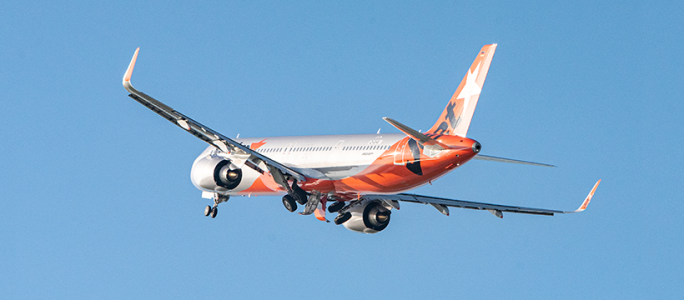Family experiences financial and emotional burden over Jetstar’s response: ‘This is just insulting’
By
Seia Ibanez
- Replies 14
Travelling can be one of life's greatest joys, especially when exploring new cultures and creating memories with loved ones.
However, for Cassandra Nichterlein and her family, their dream holiday in Japan quickly became a financial and emotional burden when their return Jetstar flight to Sydney was unexpectedly cancelled.
The Nichterlein family, including three children all under the age of six, was stranded in Osaka after their flight was cancelled due to mechanical failure.
With little information provided by Jetstar and no immediate assistance, the family was forced to ‘find their own accommodation and seek compensation from the airline’.
This unexpected delay led the family to check into a hotel, waiting for a replacement flight and a week-long ordeal that cost the family an additional $7,000.

‘It was quite traumatic, not knowing when we would get home,’ Nichterlein said.
‘You have an expectation as a customer that when you fly with an airline, you'll be safe and that if something like this were to happen, you would be looked after.’
The family returned to Australia, and Jetstar instructed them to upload their hotel receipts.
However, the family faced another hurdle. Despite Jetstar's policy stating that it would consider claims for costs caused by delays or cancellations, the Nichterleins were initially denied reimbursement because their receipts were in Japanese.
‘We spent hours and hours and hours uploading receipts and then were questioned about them, because they're written in Japanese,’ Nichterlein said.
‘They offered us a $600 payment, which is just insulting.’
This language barrier added insult to injury, as the family had already endured a stressful and costly experience.
The incident also underscores the importance of knowing your rights as a traveller. In light of the Nichterleins' situation and similar cases, the Australian government announced the establishment of a charter of rights for airline customers.
This new 'Charter of Rights' is part of a wider industry shake-up and is expected to be operational by 2026.
It aims to ensure that customers are treated fairly and receive refunds for flights that are disrupted, cancelled, or unreasonably delayed.
‘If you've bought a ticket and the flight doesn't go, you should expect the service is provided, so this is about providing remedies to consumers who have found it very difficult to pursue these issues and continuous improvement in our airlines and airports,’ Ms King said.
Aviation Expert Professor Ron Bartsch said the government made the right move, but it was ‘possibly too late’.
‘We've already seen Bonza and Rex exit the domestic market, and we've got a very entrenched duopoly now, and it's interesting and somewhat ironic that Rex Airlines had the best on time performance and lowest cancellations rate, and yet they're now no longer in existence in the domestic market,’ Professor Bartsch said.
‘So, I think it's time that Virgin and Qantas were made accountable and do pay adequate compensation when they don't provide the service they advertise.’
He also emphasised the need for reforms within the airline industry.
‘When you look at the worldwide best practice standards in passenger compensation, and the systems that they have in place in the European Union and in Canada, providing compensation does make airlines more accountable, and therefore the passengers do get a better service,’ he said.
In response to the publicised ordeal and the government's push for better consumer protection, Jetstar has since agreed to reimburse the Nichterlein family's expenses.
A spokesperson for Jetstar said that ‘the flight was cancelled due to an engineering issue on the same day that the global CrowdStrike outage took place, which grounded our flights and impacted our customer communications system’.
‘This meant we were unable to communicate with our customers and there were limited alternative flights for a number of days,’ the spokesperson added.
While Jetstar mentioned Nichterlein would be reimbursed, she had not been contacted by the airline or received money.
‘The issue is that these companies have a deliberate wall set up,’ she said.
‘They push you into accepting an offer because there's nowhere else to turn.’
 Have you ever faced a similar situation while travelling? How did you navigate the compensation process? Share your experiences and tips in the comments below.
Have you ever faced a similar situation while travelling? How did you navigate the compensation process? Share your experiences and tips in the comments below.
However, for Cassandra Nichterlein and her family, their dream holiday in Japan quickly became a financial and emotional burden when their return Jetstar flight to Sydney was unexpectedly cancelled.
The Nichterlein family, including three children all under the age of six, was stranded in Osaka after their flight was cancelled due to mechanical failure.
With little information provided by Jetstar and no immediate assistance, the family was forced to ‘find their own accommodation and seek compensation from the airline’.
This unexpected delay led the family to check into a hotel, waiting for a replacement flight and a week-long ordeal that cost the family an additional $7,000.

The Nichterlein family experienced financial and emotional burden when Jetstar’s flight was unexpectedly cancelled. Credit: Jetstar Australia / Facebook
‘It was quite traumatic, not knowing when we would get home,’ Nichterlein said.
‘You have an expectation as a customer that when you fly with an airline, you'll be safe and that if something like this were to happen, you would be looked after.’
The family returned to Australia, and Jetstar instructed them to upload their hotel receipts.
However, the family faced another hurdle. Despite Jetstar's policy stating that it would consider claims for costs caused by delays or cancellations, the Nichterleins were initially denied reimbursement because their receipts were in Japanese.
‘We spent hours and hours and hours uploading receipts and then were questioned about them, because they're written in Japanese,’ Nichterlein said.
‘They offered us a $600 payment, which is just insulting.’
This language barrier added insult to injury, as the family had already endured a stressful and costly experience.
The incident also underscores the importance of knowing your rights as a traveller. In light of the Nichterleins' situation and similar cases, the Australian government announced the establishment of a charter of rights for airline customers.
This new 'Charter of Rights' is part of a wider industry shake-up and is expected to be operational by 2026.
It aims to ensure that customers are treated fairly and receive refunds for flights that are disrupted, cancelled, or unreasonably delayed.
‘If you've bought a ticket and the flight doesn't go, you should expect the service is provided, so this is about providing remedies to consumers who have found it very difficult to pursue these issues and continuous improvement in our airlines and airports,’ Ms King said.
Aviation Expert Professor Ron Bartsch said the government made the right move, but it was ‘possibly too late’.
‘We've already seen Bonza and Rex exit the domestic market, and we've got a very entrenched duopoly now, and it's interesting and somewhat ironic that Rex Airlines had the best on time performance and lowest cancellations rate, and yet they're now no longer in existence in the domestic market,’ Professor Bartsch said.
‘So, I think it's time that Virgin and Qantas were made accountable and do pay adequate compensation when they don't provide the service they advertise.’
He also emphasised the need for reforms within the airline industry.
‘When you look at the worldwide best practice standards in passenger compensation, and the systems that they have in place in the European Union and in Canada, providing compensation does make airlines more accountable, and therefore the passengers do get a better service,’ he said.
In response to the publicised ordeal and the government's push for better consumer protection, Jetstar has since agreed to reimburse the Nichterlein family's expenses.
A spokesperson for Jetstar said that ‘the flight was cancelled due to an engineering issue on the same day that the global CrowdStrike outage took place, which grounded our flights and impacted our customer communications system’.
‘This meant we were unable to communicate with our customers and there were limited alternative flights for a number of days,’ the spokesperson added.
While Jetstar mentioned Nichterlein would be reimbursed, she had not been contacted by the airline or received money.
‘The issue is that these companies have a deliberate wall set up,’ she said.
‘They push you into accepting an offer because there's nowhere else to turn.’
Key Takeaways
- The Nichterlein family was stranded in Japan for a week due to a cancelled Jetstar flight and incurred additional expenses of $7,000.
- Jetstar initially denied the family compensation, questioning the validity of their receipts because they were in Japanese.
- The Australian government announced a new 'Charter of Rights' for airline customers, promising better remedies for disrupted flight services.
- After media intervention, Jetstar has offered to reimburse the family's expenses, though they had yet to receive any compensation at the time of reporting.








